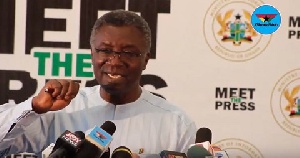Professor Kwabena Frimpong-Boateng, the Minister of Environment, Science, Technology and Innovation, has challenged private universities to rebrand themselves with innovative programmes that would make them competitive.
He said the establishment of a private university should be a market-driven process and not as a fashionable enterprise.
“Every university should have its area or areas of strength. The mode of teaching in most public and private universities should change to promote critical thinking, and provide students with set skills, to make them attractive to their employers,” the Minister added.
Prof. Frimpong-Boateng made the call at the 12th Congregation of the Regent University of Science and Technology in Accra, over the weekend, on the theme: “Strategic Policy Initiatives to Foster Vibrant Growth of Private Tertiary Institutions”.
He urged private universities to engage in relevant research, and create the space for the establishment of incubator companies that would benefit government initiatives and improve efficiency.
In all, 336 students from Ghana, Nigeria, Gabon and Benin graduated from the University comprising; 204 men and 132 women.
Fifty-nine students obtained first class honours, 175 had second class (upper division) and 94 had second class (lower division), with four passes.
Additionally, there were four post-graduate students, who graduated with Master of Divinity and Theology, while 12 students received professional certificates in HIV and Management.
Prof. Frimpong-Boateng charged private universities to position themselves with the right programmes that were in alignment with national priorities to absorb prospective Free Senior High School graduates, who would move up the education ladder to the tertiary level in the next two years.
He said the Government had started a number of initiatives that would benefit students from tertiary institutions, especially those with science and technology background.
He said government had initiated a process to reduce the period of affiliation of mentee institutions to their mentoring institutions so that private universities could receive a Charter within five years.
Prof. Frimpong-Boateng, therefore, underscored the need for private universities to come out with the requisite investments to maintain the standard in order not to compromise the quality of teaching.
The Minister admonished the graduands to be innovative, creative and flexible, to adopt to change and be hungry for more knowledge that would make them competitive on the job market.
Prof. Frimpong-Boateng acknowledged the contributions of private universities to the country’s human resource development, noting that, they were major players in the tertiary education industry and not mere supplementary institutions.
Commenting on the competition faced by private universities from public universities on enrollment, Prof. Frimpong-Boateng said Ghana is a developing country and would not afford to place any restriction on any university’s programme.
He said the nation would rather step up the efforts to get more people enrolled at the tertiary educational institutions, saying; “Government will not put any policy to stifle the nation’s goal of educating its human capital”.
Government was targeting education that would solve problems and expand the country’s economic frontiers, he added.
Rev. Prof. Emmanuel Kingsley Kwabena Larbi, the Founder and Chancellor of the University, mentioned some challenges faced by private universities, including dwindling student enrollment, inadequate funding for operations and infrastructure development, as well as high affiliation fees and unethical practices by some public universities.
He, therefore, urged government to resolve the aforementioned challenges and stated that the successes of private universities would inure to the benefit of the nation.
Prof. Nicolas N.N. Nsowah-Nuamah, the President of Regent University, in his welcome address, presented a report on the University’s activities for the year under review.
He said the University made new recruitment to enhance the capacity of its teaching staff, while some lecturers were given scholarships to upgrade themselves academically.
He announced that the University would be made a post-graduate institution; therefore much attention would be given to post-graduate programmes.
Currently, the University runs the following Faculties: Arts and Sciences, Engineering, Computing and Allied Sciences and School of Business and Leadership as well as a Graduate School.
Students, who distinguished themselves in their respective programmes were rewarded with certificates, books, cash prizes and scholarships.
Ms Catherine Lamptey, a First Class Student in Banking and Finance, was adjudged the Overall Best Student for the 2017/2018 academic year.
General News of Wednesday, 12 December 2018
Source: ghananewsagency.org

















